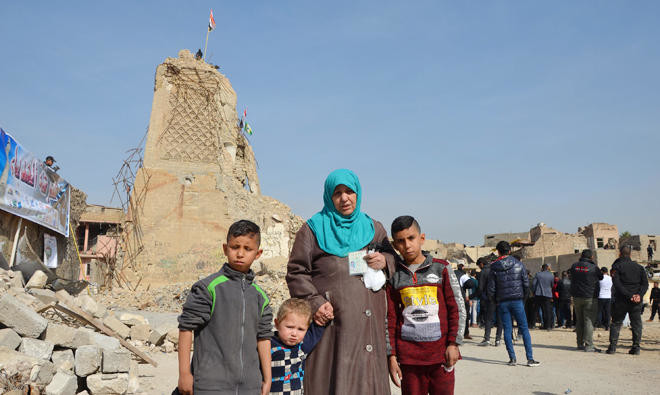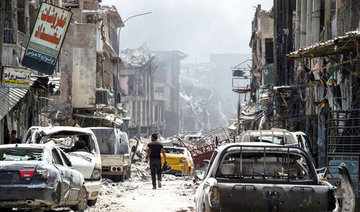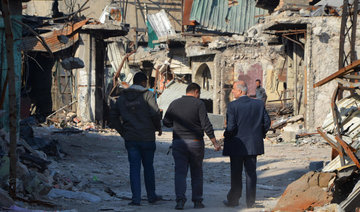FALLUJAH: The vast scale of rebuilding Iraq after Daesh’s devastating control of large areas of the country can be seen in microcosm in Fallujah.
Essaa Al-Sayer, the city’s mayor, told Arab News that more than 37,000 houses are partially damaged and 1,700 completely destroyed in the city and its outskirts.
Daesh militants relied on tactics that killed the highest number of people and caused the largest possible destruction, including huge suicide truck bombs.
A lot of the damage was also caused in the fighting when the Iraqi Army launched its operation to retake the city.
But the devastation of Fallujah is nothing compared with that of cities such as Ramadi, the capital of the vast desert province of Anbar, Mosul, the capital of Nineveh and the second largest city by population, and Baiji, one of the big towns of Salahuddin province.
Tens of thousands of houses were either destroyed or damaged in these cities, Iraqi federal officials told Arab News. Nineveh Province topped the list of the most affected areas.
The ruins of the old city of Mosul is the largest in Iraq, with 11,500 houses and shops destroyed and 35,000 partially destroyed.
People are still unable to retrieve the bodies of their loved ones buried in the rubble because of the booby traps, which are constantly exploding on civil defense teams, Mosul’s local officials told Arab News.
In December, Iraq declared the full liberation of its territories and the end of the three year-long war against Daesh, which seized lands in the north and west of the country in 2014.
The Iraqi Ministry of Planning has estimated the total cost of reconstruction of the affected cities at $100 billion, including the restoration of infrastructure and economic development.
Iraq, in coordination with Kuwait and the International Monetary Fund, is holding on Monday the largest international conference for the reconstruction of Iraq with more than 2,300 companies from 70 countries.
The conference, hosted by Kuwait, will last for three days and the Iraqi government will call on the international community to contribute to the reconstruction of Iraq by financing some of the reconstruction projects.
More than 157 strategic projects will be launched for investment.
Forty-one of them are to build residential complexes, oil refineries, airports, railways, bridges, subways, and petrochemical factories, said Iraqi officials involved in the preparations of the conference.
“We do not rely too much on grants given by participating countries to secure the amount needed to rebuild Iraq.Our true reliance is on investment,” Abdulzahra Al-Hindawi, the spokesman for the Iraqi Ministry of Planning, told Arab News.
“Iraq will present a package of investments and we believe that there are many companies willing to work in Iraq.
“We hope that the investment will move the ball of reconstruction and launch it.”
Iraq puts reconstruction challenge in hands of global investors
Iraq puts reconstruction challenge in hands of global investors

Palestinian health ministry says 4 killed in Israeli West Bank strike

RAMALLAH: The Palestinian health ministry said Thursday that an Israeli air strike on a car killed four Palestinians and wounded three near the occupied West Bank city of Tulkarem.
The ministry announced that the Palestinians were killed “as a result of the (Israeli) bombing of a vehicle in Tulkarem camp,” which the Israeli army did not immediately confirm to AFP.
Turkiye, Iran leaders at Muslim summit in Cairo

- Relations between Egypt and Iran have been strained for decades, but diplomatic contacts have intensified since Cairo became a mediator in the war in Gaza
CAIRO: The leaders of Turkiye and Iran were in Egypt on Thursday for a summit of eight Muslim-majority countries, meeting for the first time since the ouster of Syria’s president Bashar Assad.
Turkiye historically backed the opposition to Assad, while Iran supported his rule.
The gathering of the D-8 Organization for Economic Cooperation, also known as the Developing-8, was being held against a backdrop of regional turmoil including the conflict in Gaza, a fragile ceasefire in Lebanon and unrest in Syria.
In a speech to the summit, Turkiye’s Recep Tayyip Erdogan called for unity and reconciliation in Syria, urging “the restoration of Syria’s territorial integrity and unity.”
He also voiced hope for “the establishment of a Syria free of terrorism,” where “all religious sects and ethnic groups live side by side in peace.”
Iranian President Masoud Pezeshkian urged action to address the crises in Gaza, Lebanon and Syria, saying that it is a “religious, legal and human duty to prevent further harm” to those suffering in these conflict zones.
Pezeshkian, who arrived in Cairo on Wednesday, is the first Iranian president to visit Egypt since Mahmoud Ahmadinejad, who visited in 2013.
Relations between Egypt and Iran have been strained for decades, but diplomatic contacts have intensified since Cairo became a mediator in the war in Gaza.
Foreign Minister Abbas Aragchi visited Egypt in October, while his Egyptian counterpart Badr Abdelatty traveled to Tehran in July to attend Pezeshkian’s inauguration.
Ahead of the summit, the Iranian top diplomat said he hoped it would “send a strong message to the world that the Israeli aggressions and violations in Gaza, Lebanon and Syria” would end “immediately.”
Erdogan was in Egypt earlier this year, and discussed with President Abdel Fattah El-Sisi economic cooperation as well as regional conflicts.
Established in 1997, the D-8 aims to foster cooperation among member states, spanning regions from Southeast Asia to Africa.
The organization includes Egypt, Turkiye, Iran, Nigeria, Pakistan, Bangladesh, Indonesia and Malaysia as member states.
Iraq begins repatriating Syrian soldiers amid border security assurances

DUBAI: Iraq has begun the process of returning Syrian soldiers to their home country, according to state media reports on Wednesday.
Lt. Gen. Qais Al-Muhammadawi, deputy commander of joint operations, emphasized the robust security measures in place along Iraq’s borders with Syria.
“Our borders are fortified and completely secure,” he said, declaring that no unauthorized crossings would be permitted.
Muhammadawi said that all border crossings with Syria are under tight control, stating: “We will not allow a terrorist to enter our territory.”
Turkiye won’t halt Syria military activity until Kurd fighters ‘disarm’

ISTANBUL: Turkiye will push ahead with its military preparations until Kurdish fighters “disarm,” a defense ministry source said Thursday as the nation faces an ongoing threat along its border with northern Syria.
“Until the PKK/YPG terrorist organization disarms and its foreign fighters leave Syria, our preparations and measures will continue within the scope of the fight against terrorism,” the source said.
Hamas says Israeli strikes in Yemen ‘dangerous development’

GAZA: Palestinian militant group Hamas said Thursday that Israel’s strikes in Yemen after the Houthi rebels fired a missile at the country were a “dangerous development.”
“We regard this escalation as a dangerous development and an extension of the aggression against our Palestinian people, Syria and the Arab region,” Hamas said in a statement as Israel struck ports and energy infrastructure in Yemen after intercepting a missile attack by the Houthis.












